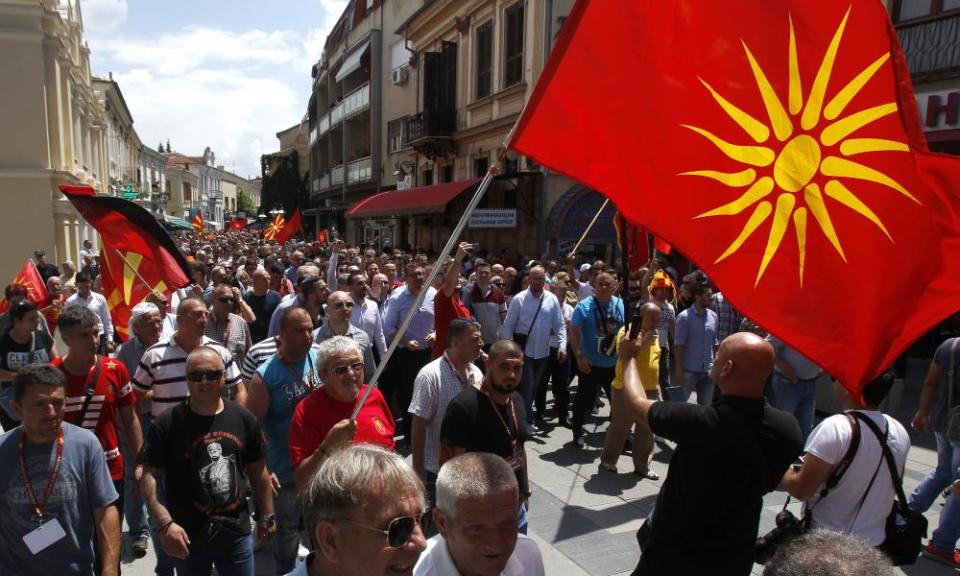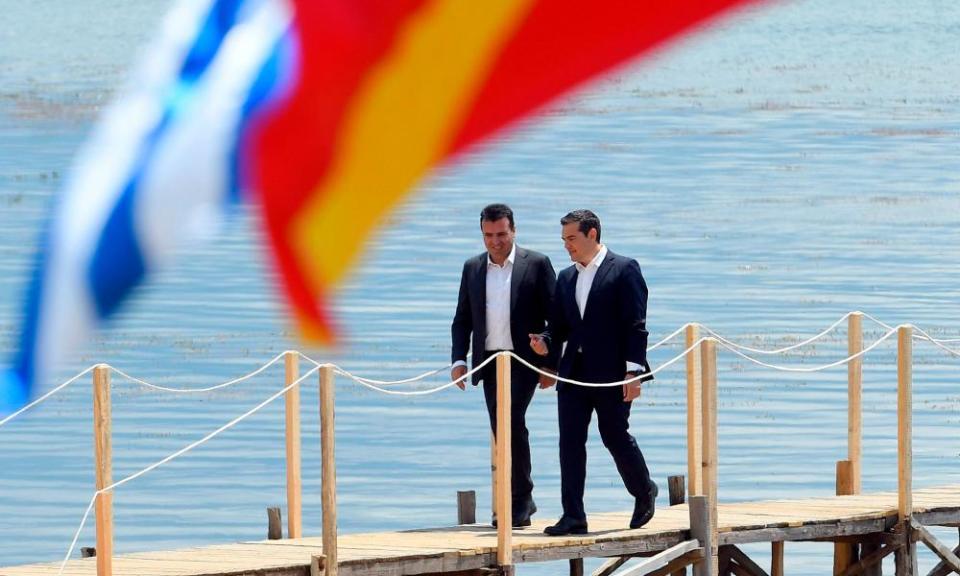Macedonia changes name, ending bitter dispute with Greece

After almost three decades, one of the most intractable Balkan disputes has ended on the banks of a lake as Greece and Macedonia signed an accord formally heralding a new era of peace.
On a historic day for a region long soaked in the politics of animosity, the prime ministers of the neighbouring states declared that the bitter dispute over Macedonia’s name was finally over.
Once ratified, the pact will see the small Balkan nation being renamed the Republic of North Macedonia. “This is our own rendezvous with history,” the Greek prime minister, Alexis Tsipras, told officials gathered under a giant marquee pitched at the edge of Lake Prespa, where the borders of Greece, Macedonia and Albania meet.
“We are here to heal the wounds of time,” he insisted, adding that for too long the Balkans had suffered from “the poison of chauvinism and the divisions of nationalist hatred”.
The Macedonian prime minister, Zoran Zaev arrived at the ceremony by speedboat. He called on critics of the agreement, which was announced five days ago, “to step out of the past and look to the future”.
“Our peoples want peace … We will be partners and allies,” said Zaev, who must have the pact passed by parliament and endorsed by a referendum before it is accepted by Greece. “We are proud of today’s agreement … May we stay as forever united as we are on this day.”
There was rapturous applause as the countries’ respective foreign ministers signed the accord.
To get to this point has not been easy. And the significance of a day, as heavy in symbolism as historic import, was lost on neither.
From the moment its neighbour proclaimed independence as the Republic of Macedonia following the collapse of Yugoslavia in 1991, Greece has believed its chosen name and symbols conveyed ill-disguised territorial claims against its own province of Macedonia.

Maps depicting the landlocked state’s borders extending to the strategic port city of Thessaloniki, Greek Macedonia’s capital, have helped stoke fears. So, too, has the appropriation of ancient Greek figures. The erection of a gargantuan statue of the warrior king Alexander the Great in Skopje’s central square fuelled further claims of cultural theft.
In 1994, as the confrontational rhetoric deepened, Athens imposed a trade embargo against its neighbour, saying the Slavic state’s policies posed “a real and present danger to Greece”.
But on Sunday all of that appeared to have been relegated to the past. Taking the podium after adding his own signature to the accord, Matthew Nimetz, the UN special envoy who has mediated negotiations since the early 1990s, spoke of the “political courage” required to arrive at this point. The EU foreign affairs chief Federica Mogherini and EU enlargement commissioner Johannes Hahn, who were present for the signing, spoke glowingly of the signing as a rare moment of success for Europe.
The pact opens the way to Macedonia joining Nato and beginning EU accession talks. Previous such moves have been blocked by Athens and triggered growing western security concerns in a region that has become increasingly susceptible to Russian influence.
By agreeing to rename itself the Republic of North Macedonia the country will replace an interim accord issued 23 years ago that allowed it to join the UN as the Former Yugoslav Republic of Macedonia.

The agreement means Skopje will need to make more than 150 changes to its constitution before Greece brings the pact before its own parliament for ratification – a task replete with challenges for Zaev
, who like Tsipras has taken a progressive view on the issue, and faces considerable opposition from nationalists. Macedonia’s president, Gjorge Ivanov, has refused to support the deal, presaging a stormy few months ahead.
Changing hearts and minds on an issue that is as much about identity – ethnic, cultural and linguistic – as it is about pride, will be paramount in the runup to a referendum that Zaev has called for the autumn at the latest.
But the social democrat, who has been likened to John F Kennedy, is also described as a natural peacemaker by supporters desperate to see their impoverished country join the rest of the world. Iovanov can veto the accord but ultimately will have to accept it if parliament endorses the pact a second time round.
Tsipras, who survived a vote of no-confidence on Saturday brought against his leftwing government by the conservative opposition over the deal, faces similar protests. Mustering enough votes in parliament to ratify the pact without the support of the nationalist Akel party, his junior partner, won’t be easy.
But while the path ahead is strewn with potholes, both sides have said there is no going back. Affiliate parties in Europe have already begun jockeying to convince politicians in Athens and Skopje that the row has to end.
The Lake Prespa accord erases the last trace of the old Yugoslavia. With the adoption of its new name, Macedonia will not only assume a new title, it will ultimately change the map of Europe.

 Yahoo News
Yahoo News 